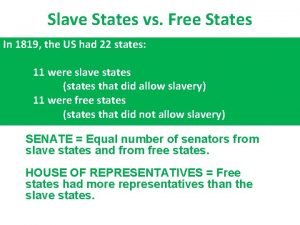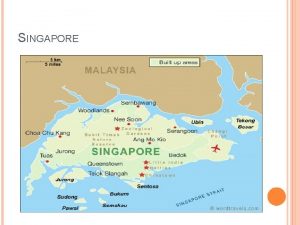COUNTRY STUDY SINGAPORE An Overview In 1819 Singapore







- Slides: 7

COUNTRY STUDY SINGAPORE

An Overview • In 1819, Singapore was founded by a British colony. • It joined Malaysian Federation in 1963 but was asked to leave two years later. • Singapore became independent in 1965. At the outset, it had to follow outward-looking industrialization policy, due to the small size of the domestic economy.

An Overview (continued) • Singapore had an impressive growth rate of about 10% (and 8% during 1970 -81). • Singapore had almost full employment of labor (1. 7 percent to 3 percent unemployment rates). • Singapore’s population is approximately 4. 6 million, with working age population representing 77% of the population.

An Overview (continued) • Three ethnic groups: Chinese-77%, Malays-14% and Indians-8% • Open and corruption-free economic environment along with legendary cleanliness if the city-state. • Per Capita Income: $52, 000 • Agriculture: 0% Manufacturing: 33% Services: 67%

Development Model • Export-Orientation • Foreign investment in manufacturing sector from almost 3, 000 MNCs • Heavy dependence on foreign workers (600, 000 in 2000)-constitutes 27% of the labor force • Government intervention in many economic activities-compulsory saving schemes, probusiness and pro-labor government is a unique feature • Central Provident Fund

Development Model (continued) • State-directed investments in strategic government-owned corporations • Development of technological sector, biotech industries and pharmaceutical sector • Financial and technology hub with its attractive infrastructure and skilled workforce

Current Developments/ Problems • Global Recession • Resource shortages: land, water • High-cost economy-labor shortage and inflation, high rents. In 2006, office rents tripled • Pharmaceutical hub and growth of R&D and scientific knowledge • Labor disputes: Foreign workers; Government encourages early resolutions • Strong trade unions – but work government and management • Reduce dependence on ICT global demand













